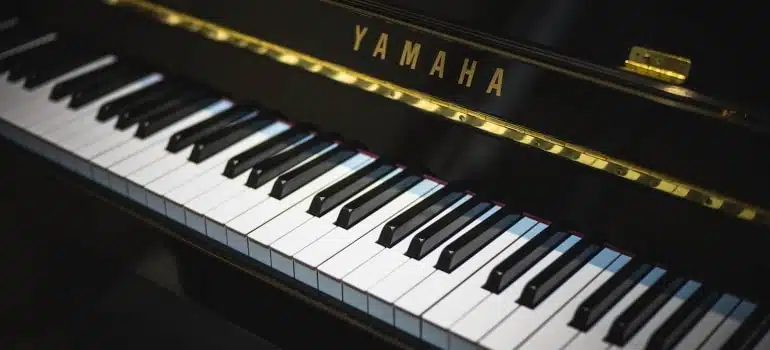The dos and don’ts of storing a piano
Storing a piano may seem daunting at first. However, it’s a necessary step to ensure that your instrument remains in excellent condition and is protected from damage. Whether you’re relocating, living in a temporary home, need to downsize, or just have to store your piano for a while, proper storage is essential for maintaining its quality and longevity. Fortunately, professional movers Miami residents rely on can provide expert assistance in transporting your piano to a storage facility. Thus ensuring it’s properly stored. In this instructive guide, we’ll cover the dos and don’ts of storing a piano. This way, you can make effective decisions and make sure your instrument is safe and secure.

Pros and cons of storing a piano
Storing a piano has both pros and cons that you need to consider. However, the advantages of proper piano storage far outweigh the disadvantages. The most significant advantage of storing a piano is its protection against potential damage from environmental factors such as humidity, temperature fluctuations, and pests. Proper storage also helps to prevent physical damage, such as scratches or dents, which can result from improper handling or accidental impacts. Besides, storing your piano frees up significant space in your home.
However, hiring professional piano movers Miami offers to handle the transportation and storage is crucial. Attempting to move a piano on your own can lead to severe injury and potential harm to the piano. Therefore, it’s always best to leave the piano to the experts. Doing this, you’ll ensure the safety and protection of both yourself and your instrument.
When and where to store a piano?
Knowing when and where to store a piano is vital to secure its protection and longevity. You may need to store a piano in several situations, including when moving to a new home, downsizing your living space, or undergoing home renovations. When considering where to store your piano, it’s essential to keep in mind the following:
- Choose a climate-controlled environment to prevent exposure to extreme temperatures and humidity levels.
- Store the piano away from direct sunlight and heat sources.
- Avoid damp or moist areas, as moisture can cause warping or damage to the piano’s wooden components.
Selecting a suitable storage environment for your piano is a must. The ideal storage location should provide a consistent temperature and humidity level and protection from pests and other potential hazards. By finding proper storage space and following the necessary precautions, you can help ensure that your piano remains in good condition and is ready to use when needed.

Space required for storing different types of pianos
The amount of space required for storing a piano depends on the type of piano. Upright pianos typically need less space than grand pianos. A standard upright piano can fit into dimensions 5 feet wide, 2.5 feet deep, and 5 feet tall. Grand pianos, however, require more space due to their size and shape. A baby grand piano can fit into an area of 5 feet wide and 6.5 feet deep. A full-size concert grand piano may require up to 9 feet of space. Digital pianos, being smaller and more compact, require significantly less space than acoustic pianos.
Dos and don’ts when storing a piano
When storing a piano, there are certain dos and don’ts that you should keep in mind. Firstly, cleaning and dusting the piano thoroughly before storing it is crucial to prevent dust and dirt from accumulating and potentially damaging the instrument. Additionally, it’s recommended to detach the pedals and other accessories to avoid damage during transportation and storage. To further protect the piano, it should be covered with a protective cover to prevent dust, moisture, and other potential hazards from reaching it. When handling the piano during storage, it’s important to:
- Lift the piano from its legs or base rather than its fragile components
- Don’t pivot: Avoid tilting or moving the piano on its side
- Use proper lifting and moving techniques to prevent injury and damage to the piano.
While following these dos and don’ts is essential, the best decision you can make is to hire professional moving services Miami companies offer. The movers have the experience, tools, and equipment needed to safely and efficiently handle your piano’s transportation and storage. By entrusting the job to professionals, you can have peace of mind knowing that your instrument is in good hands.

How to protect your piano during storage
When protecting your piano, there are two types of damage to consider – physical and environmental. To protect the piano from physical damage during storage, ensure it is securely anchored and free from bumps, impacts, and scratches. It’s also paramount to use high-quality padding and covers. This way, you’ll provide a barrier. Besides, maintain proper temperature and humidity levels in the storage area. Extreme fluctuations in temperature or humidity can cause damage to its wooden components and internal mechanisms. Additionally, take pest control measures to prevent rodents and insects from harming the piano. Hiring a professional moving and storage company offering white glove storage services is the best way to protect your piano.
An overview of the dos and don’ts of storing your piano
When storing your piano, cleaning it, detaching the pedals, and covering it for protection are the key steps. Proper handling involves lifting it correctly and keeping it in a climate-controlled environment, away from environmental hazards and pests. The best way to ensure appropriate storage is by hiring professional moving and storage services that provide climate-controlled storage and pest control measures. Consider getting moving quotes Miami companies have to offer to ensure your piano remains in excellent condition for years.
